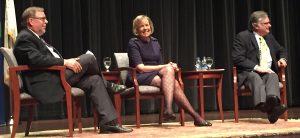Panel talks ‘fake news’, other challenges traditional media face
By Jack McCarthy Chronicle Media — October 21, 2018
Moderator Rick Pearson (left) is joined by NBC-5 reporter Mary Ann Ahern (center) and veteran Iowa journalist David Yepsen at a recent Aurora University forum on the role of media in politics. (Photo by Jack McCarthy / Chronicle Media)
The nation’s legacy media — traditional newspapers, radio and television — continue to find their dominance slipping as new information sources gain increased relevance.
“This is a strange time we live in,” said David Yepsen, veteran Iowa journalist during a recent discussion on the role of media in politics at Aurora University. “An era of emerging social media journalism … presents a real challenge for reporters and all of this happens at a time when there’s an unprecedented amount of news.”
Yepsen and two other traditional journalists talked about changing roles while defending their industry, fact-based news gathering and trustworthiness at an AU Town Square Series session at Crimi Auditorium.
Reporters and editors, already juggling increased responsibilities due to staff and budget cuts, must also embrace and contribute to social media platforms like Facebook, Instagram, Twitter and others.
“It has changed so much,” said Mary Ann Ahern, associated with NBC News and Chicago’s NBC 5 since 1989 and political reporter since 2006. “Today it’s constantly reacting to what’s going on in (Washington) D.C., what’s going on in our city, what’s in Springfield. If I didn’t have ADD before this job, I have it now.
“I live with Twitter on my phone and look at it all day long. Politics and sports are very social media driven and because there are no deadlines, you don’t wait to tell your story.”
Yepsen spent 34 years covering politics for the Des Moines Register in Iowa and also served as director of the Paul Simon Public Policy Institute at Southern Illinois University from 2009-16. He currently hosts a weekly Iowa public affairs program.
Despite upheavals in his profession, fundamental principles have not changed.
“The purpose of journalism is to serve the community,” Yepsen said. “The purpose of political reporting is to give people the information they need to make a decision on who to vote for.”
But ideals run into the reality of reduced staff and resources and constant pressure to turn out more content.
“The term in the news business these days is (that) we’re not necessarily journalists as much as we’re content producers,” said moderator Rick Pearson, a Chicago Tribune political writer, radio host and regular at Aurora University forums. “I want to go back to being a context producer and provide the why of the story.”
The session was timely given the media’s role in covering next month’s high-stakes midterm elections.
That work is complicated by increased media mistrust brought on, in part, by President Donald Trump’s charges of “fake news” from his White House bully pulpit and at a series of campaign-style events around the country.
“I think in this era of “fake news” — I don’t care what platform you’re working on — we all have to do a better job of saying this is true, that isn’t,” Yepsen said. “Call it fact-checking, I call it basic journalism.”
But Yepson also said it was time for a broader defense of fact-based reporting and service to readers, listeners and viewers.
“We do a lousy job of defending ourselves,” Yepson said. “If the President of the United States is up there talking about fake news, there better be news organizations replying back. … If you have a politician attacking the media, you’ve got to have a two-track strategy. You’ve got to cover what he says and then respond to it and you’ve got have executives who say ‘no, it isn’t fake.’”
—- Panel talks ‘fake news’, other challenges traditional media face —–







